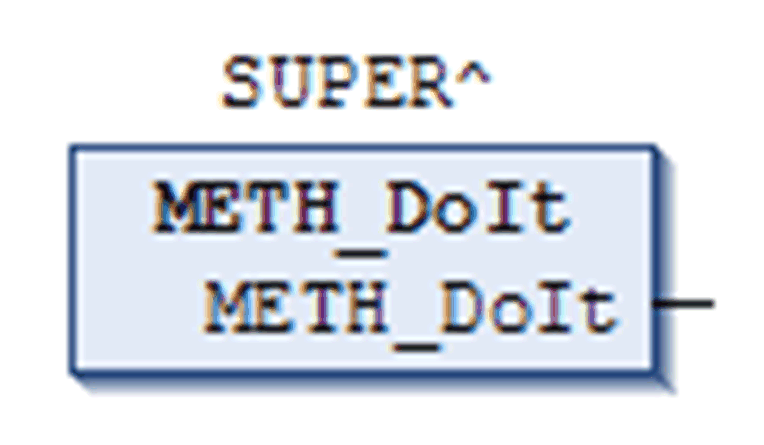SUPER Pointer
Overview
For each function block that extends a base function block, a pointer with name SUPER is automatically available. It points to the base function block instances.
This provides an effective solution for the following issue:
-
SUPERoffers access to methods of the base function block implementation. With the keywordSUPER, a method can be called which is valid in the base (parent) class instance. Thus, no dynamic name binding takes place.
SUPER may only be used in methods and in the associated function block implementation.
Because SUPER is a pointer to the base function block, you have to dereference it to get the address of the function block: SUPER^.METH_DoIt
SUPER Call in Different Implementation Languages
|
Implementation Language |
Example |
|---|---|
|
ST |
|
|
FBD/CFC/LD |

|
SUPER is not yet implemented for Instruction List.
Example
Use of SUPER and THIS pointers.
FUNCTION_BLOCK FB_Base
VAR_OUTPUT
iCnt : INT;
END_VAR
METHOD METH_DoIt : BOOL
iCnt := -1;
METHOD METH_DoAlso : BOOL
METH_DoAlso := TRUE;
FUNCTION_BLOCK FB_1 EXTENDS FB_Base
VAR_OUTPUT
iBase: INT;
END_VAR
// Calls the method defined under FB_1
THIS^.METH_DoIt();
THIS^.METH_DoAlso();
// Calls the method defined under FB_Base
SUPER^.METH_DoIt();
SUPER^.METH_DoAlso();
iBase := SUPER^.iCnt;
METHOD METH_DoIt : BOOL
iCnt := 1111;
METH_DoIt := TRUE;
PROGRAM PLC_PRG
VAR
myBase: FB_Base;
myFB_1: FB_1;
iTHIS: INT;
iBase: INT;
END_VAR
myBase();
iBase := myBase.iCnt;
myFB_1();
iTHIS := myFB_1.iCnt;